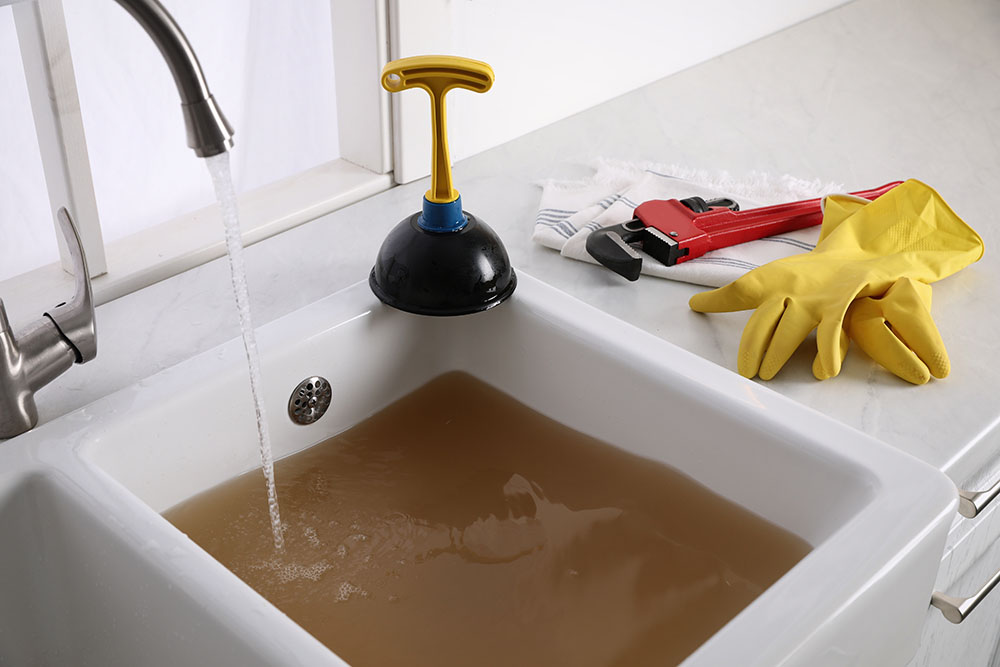Why Is Your Drain Clogged?

CONTENTS
- What are drain clogs?
- What are the common causes of drain clogs?
- What environmental factors cause clogs?
- What habits can cause drain clogs?
- What are the consequences of a drain clog?
- How you can prevent drain clogs
- How to address recurring drain clogs
- Frequently asked questions
- Get in touch
Knowing the reasons behind drain blockages is crucial for ensuring your pipes keep flowing without issue. A blocked drain poses a greater threat beyond just being a nuisance. If left unattended, it has the potential to result in significant problems.
At ICE Drainage, we offer drain unblocking services for your domestic or commercial property. Whether you need to unblock a clogged drain or want to install a new system, our drainage experts can help.
Read on to learn more about the various causes of drain blockages, from the accumulation of hair and debris to environmental factors such as hard water.
What are drain clogs?
Drain clogs occur when a blockage prevents water from flowing freely through your pipes. In homes and businesses alike, delaying the resolution of these obstructions can escalate into more serious and costly complications.
Understanding these obstructions is key to creating targeted strategies for their mitigation and resolution. From the accumulation of hair and grease to foreign objects flushed down the toilet, each cause has its solution.
Symptoms like slow drainage, unpleasant odours, or even water backup indicate you might be dealing with a clogged drain. Recognising these signs early can save time and money on repairs.
What are the common causes of drain clogs?
A common cause linked to clogged drains is the tangled mess created by hair and debris merging with soap residue, leading to tough obstructions. Soap scum combined with minerals in hard water forms a hard residue that narrows pipe diameter, leading to reduced drainage efficiency.
The situation can become more difficult when food particles and hardened grease build-up. Over time, grease adheres to pipe interiors, solidifying and trapping food debris in its path. This restricts water flow and can also lead to unpleasant odours.
Lastly, foreign objects or improper disposal practices — like flushing non-biodegradable items down the toilet — can instantly clog pipes, causing immediate drainage issues.
What environmental factors cause clogs?
Environmental elements play a crucial role in the health of our drainage systems. Hard water with minerals such as calcium and magnesium is the common cause of clogging. Calcium and magnesium can build up in the pipes, resulting in slow water movement and clogs.
Another issue is tree root intrusion. Trees frequently infiltrate sewer lines through any fissures or connections, resulting in significant blockages.
Weather-related issues such as freezing temperatures can also cause pipes to contract and crack, while heavy rainfall might overwhelm systems not designed for large volumes.
Acknowledging environmental conditions is crucial for minimising potential hazards when planning maintenance schedules. By understanding how natural factors contribute to clog formation, you can develop more effective strategies for prevention and repair.
What habits can cause drain clogs?
Neglecting regular maintenance is how your drains will clog. Regular check-ups and cleanings are essential to keep everything flowing and debris-free.
Flushing non-biodegradable items down the toilet or sink might seem convenient, but it can quickly lead to a clog. Items like wet wipes, cotton pads, and even certain types of toilet paper do not break down easily and can block your drains over time.
The frequent misuse of waste disposal units can also create significant obstructions in drainage systems. Installing these may seem like an easy way to dispose of food, but the UK's plumbing and treatment system cannot handle these devices. They are also looking to be banned before 2026.
What are the consequences of a drain clog?
Slow drainage and standing water are early warning signs that your plumbing system could be at risk. When water backs up, it creates an ideal environment for bacteria to thrive, leading to potential health hazards within your home.
Foul odours emanating from drains are unpleasant and indicate decaying organic matter in your pipes. The breakdown of organic material in your pipes can attract pests and bacteria, further endangering your home's cleanliness.
Persistent clogs weaken your plumbing infrastructure, potentially causing cracks or bursts in pipes. Damage like this forces you to spend on expensive fixes and can affect the overall quality of water on your property.
How you can prevent drain clogs
It is key to ensure the drains stay unclogged and clean to keep your home's plumbing running. To achieve this, you must implement regular maintenance routines, which can prevent issues before they start.
Proper disposal of waste is also important. You can avoid blockage risks by ensuring leftover food or waste materials do not enter pipes connected to sinks and toilets.
Additionally, using drain barriers and advanced filtration systems acts as a preventative shield, catching any debris that might cause obstructions.
How to address recurring drain clogs
Experiencing frequent drainage clogs may indicate a more significant complication in your pipes. Addressing these persistent blockages requires a deep dive into the underlying factors that contribute to them.
Simple home remedies like baking soda and vinegar or hot water may work for minor clogs. But if these efforts fail, it is recommended that you call a drainage expert. Professional plumbers have the right tools and methods to identify and tackle the root problem of a persistent clog.
Besides quick repairs, integrating enduring strategies like consistent inspections can prevent future issues. Installing strainers over drains catches debris before it enters your pipes while knowing what goes down the sink saves you from a potential drainage block.
Frequently asked questions
What causes drains to become clogged?
Drains can become clogged due to various reasons, including hair, soap scum, and food debris in bathroom drains.
How can I prevent clogged drains?
Use drain screens or hair catchers to prevent hair and debris from entering bathroom drains. Dispose of food scraps and cooking grease in the trash rather than rinsing them down the kitchen sink. Avoid flushing non-biodegradable items down the toilet and schedule routine maintenance.
How can I unclog a drain myself?
Using a plunger to create suction and dislodge the blockage or pouring boiling water down the drain to dissolve grease and debris.
When should I call a drainage expert?
If you are experiencing persistent or recurring clogs, foul odours or gurgling sounds, slow drainage or standing water, you should contact a drainage company.
Get in touch
For thorough drain unblocking services, you can rely on our team at ICE Drainage. Our experts have years of experience in the drainage industry, well-equipped to fit new systems, replace them, or simply fix a burst pipe.
To learn more about our various drainage services, get in touch with us today at 020 3376 4801 or [email protected]. We offer emergency drainage solutions no matter where you are in the UK, working 24/7, all year round.

Speak with me today,
I’m here to help
By asking you a few questions either via phone or email I can immediately provide a realistic estimation of the cost.

Why choose us?
- Cater to a wide variety of cleaning situations
- Nationwide coverage, available 24/7
- Cater to commercial and domestic clients
- Free survey provided prior to quotation
- Emergency response team
- Offer a bespoke service designed to suit all your needs
- All technicians hold professional health and safety qualifications, including BICSc, IOSH, Dewpoint Professional & Safe Contractor
We’re fully accredited
We place best practise, professional expertise and health and safety at the core of our business. We’re fully compliant with all legal obligations. You can view a list of our accreditations below, or visit our Health & Safety page for more information.











-RGB-small.1707319151.jpg)




















